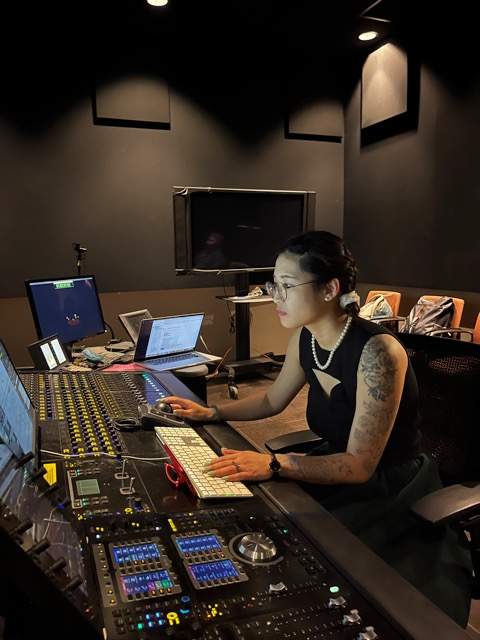
Rebecca Grass: Sound as a Spiritual Practice

Watching a film is entertainment but it can be so much more. Through the medium we can experience unfamiliar places and people. We can find ourselves in settings that are more than unusual, they are impossible to access by any other means. Storytelling is transportive and can inspire, elevating the heart and mind to explore. Those who create these vehicles of wonderment, what is their motivation? Their motivation is likely as varied as the number of individuals who partake in the creative process. Any presumption of what drives an artist evaporates when you discuss the process with someone like Rebecca Grass. An extraordinarily talented professional who utilizes her skill in varied areas of sound (re-recording mixing, sound design, dialogue editing, music editing, foley, etc.) on numerous films, Rebecca’s attachment to her work and her career contradicts any idea that you can categorize an individual’s mindset based on their career. Rebecca’s esteem in the industry is evident via her collaborations with professionals such as Richard Burton (of the Oscar Winning Film Babel) on Neurodivergent, Midge Costin (of the Oscar Nominated Crimson Tide and Armageddon) on numerous projects, and a host of others. There is a community of highly gifted artists like these who never see the adulation of the public but receive resounding praise within the industry; this is the area where Rebecca Grass feels most at ease.

As soon as recorded sound became an element of movies, it was obvious that storytelling in this medium was forever changed. Much attention is given to the spectacle of sound in filmmaking but the finer points are truly what makes a story believable. The layering, the positioning, the characteristics; these are malleable to any type or genre or film and are essential to the audience bonding with the characters and story. Rebecca Grass came to her “sound centric” career in film in perhaps the least intuitive way. She confesses, “I started out my career as a screenwriter, which now that I think about it, I chose it because of the need to express myself through words. The usage of language in literature has always fascinated me in a way how words and sentences can depict feelings in a person that before they read it in the writing form, they don’t even know that feeling existed in them. I was working with another writer on several series in their early stages before I went to grad school. I think that was the time when I felt this emptiness of how writing is fulfilling but also abstract and distant from actual life. You can read something so profound and detailed that it’s as if you actually lived that life through the character, but at the end of the day it is not the same as living your own life.”
This idea of a connection and communication that exists somewhere in the ether would eventually direct Ms. Grass to explore how sound affects filmmaking and the emotional experience of telling and receiving a story. The power that can be transmitted through different choices and variations became evident to her through this process. Unlocking that power can not only be all-consuming in the field of sound design/re-recording mixing but it can be a solitary one. Rebecca finds deep fulfillment and connection in her work. She imparts, “For me, doing sound for film has a strong link with my spirituality search and my inner peace. How a person would listen to this world has great things to do with who they are. To design the sound for a film, is to direct the audience how to hear. You do that by directing their attention as well as directing your own. Just like any other activities, filmmaking is a tool for me to be mindful, to pay better attention and to know myself.”
For a sampling of Rebecca’s remarkable work, view Neurodivergent (American Society of Cinematographers Nominated, DaVinci Film Festival Awarded, KCET Fine Cut Festival Awarded), Ikaw at Ako (“You and I” –Official Selection of both the Austin Asian American Film Festival and the Los Angeles Asian Pacific Film Festival), and Taste of Cherry (currently in its festival run).
Writer: Winston Scott